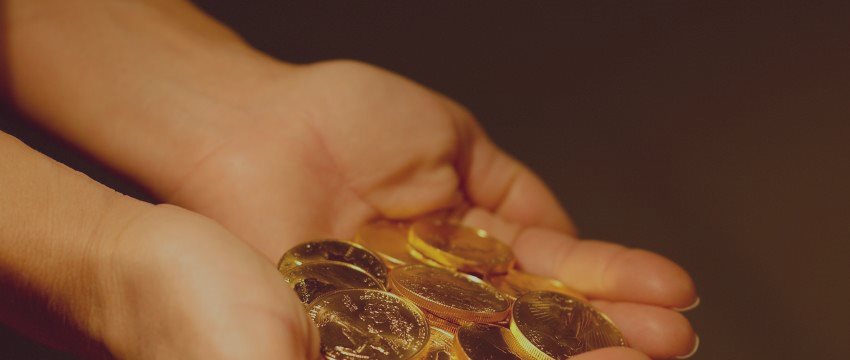Investing in gold can be accomplished in 3 popular ways:
- Buy physical gold coins or bullion.
- Buy gold ETFs.
- Buy gold futures.
One of the biggest benefits of physical gold is that you own the metal and don't need to worry about transaction costs associated with other types of gold investments.
========
Online interview of Michael J. Kosares
Question. What kind of gold should I buy?
Answer. We
probably get that question more than any other -- pretty much on a daily
basis. The answer, however, is not as straightforward as you might
think. What you buy depends upon your goals. We usually answer the "What
should I buy?" question with one of our own: "Why are you interested in
buying gold?" If your goal is simply to hedge financial uncertainty
and/or capitalize on price movement, then contemporary bullion coins
will serve your purposes. Those concerned with the possibility of
capital controls and a gold seizure, or call-in, often include historic
pre-1933 gold coins in their planning. Both the contemporary bullion
coins and historic gold coins carry modest premiums over their gold
melt value, track the gold price, and enjoy strong liquidity
internationally.
Q. When should I buy?
A. The short answer is 'When you need it.' Gold, first and foremost, is wealth insurance. You
cannot approach it the way you approach stock or real estate
investments. Timing is not the real issue. The first question you need
to ask yourself is whether or not you believe you need to own gold. If
you answer that question in the affirmative, there is no point in
delaying your actual purchase, or waiting for a more favorable price
which may or may not appear. Cost averaging can be a good strategy. The
real goal is to diversify so that your overall wealth is not compromised
by economic dangers and uncertainties like the kind generated by the
2008 financial crisis, or those now unfolding in Europe and Japan.
Q. Why not wait for the necessity to arise, then buy gold?
A. Over the
past few years, as concern about a financial and economic breakdown
spread, there were periods of gold coin bottlenecks and actual
shortages. In 2008-2009 at the height of the financial crisis, demand
was so great that the national mints could not keep up with it. The flow
of historic gold coins from Europe was also insufficient to meet
accelerating demand both there and in the United States. Premiums
shot-up on all gold coins and a scramble developed for what
was available. There is an old saying that the best time to buy gold
is when everything is quiet. I would underline that sentiment.
Q. Can you give us a profile of the typical gold investor?
A. Gold
owners are a group of people I have come to know very well in my 40+
years in the business. Contrary to the less than flattering picture
sometimes painted by the mainstream press, the people we have helped
become gold owners are among those we rely upon most in our daily lives
-- our physicians and dentists, nurses and teachers, plumbers,
carpenters and building contractors, business owners, attorneys,
engineers and university professors (to name a few.) In other words,
gold ownership is pretty much a Main Street endeavor. A recent Gallup
poll found that 34% of American investors rated gold the best investment
"regardless of gender, age, income or party ID. . ." In that survey,
gold was rated higher than stocks, bonds, real estate and bank savings.
Q. What about high net worth investors?
A.
Traditionally, wealthy, aristocratic European and Asian families have
kept a strong percentage of their assets in gold as a protective factor.
The long term economic picture for the United States has changed
enormously over the past several years. As a result, that same
philosophy has taken hold here particularly among those interested in
preserving their wealth both for themselves and for their families from
one generation to the next. In recent years, we have helped a good many
family trusts diversify with gold coins and bullion at the advice of
their portfolio managers.
Q. You frequently mention gold as insurance. What do you mean by that?
A. Gold's
baseline, essential quality is its role as the only primary asset that
is not someone else's liability. That separates gold from the majority
of capital assets which in fact do rely on another's ability to pay,
like bonds and bank savings, or the performance of the management, or
some other delimiting factor, as is the case with stocks. The first
chapter of the ABCs of Gold Investing ends with this:
"No matter what happens in this country, with the dollar, with the stock
and bond markets, the gold owner will find a friend in the yellow metal
-- something to rely upon when the chips are down. In gold, investors
will find a vehicle to protect their wealth. Gold is bedrock."
Q. What percentage of my assets should I invest in gold?
A. Once
again the answer is not cut and dry, but a general rule of thumb is 10%
to 30%. How high you go between 10% and 30% depends upon how concerned
you are about the current economic, financial and political situation.
Recently, CNBC television commentator Jim Cramer strongly advocated a
20% gold diversification.
Q. In your book, you state: "Who you do business with is one of the most important aspects of gold investing." Why is that?
A. A solid,
professional gold firm can go a long way in helping the investor
shortcut the learning curve. A good gold firm can help you avoid some
the problems and pitfalls encountered along the way, and provide some
direction. It can help you in the beginning and through the course of
your gold ownership both in making additions to your portfolio and
liquidations.
========



